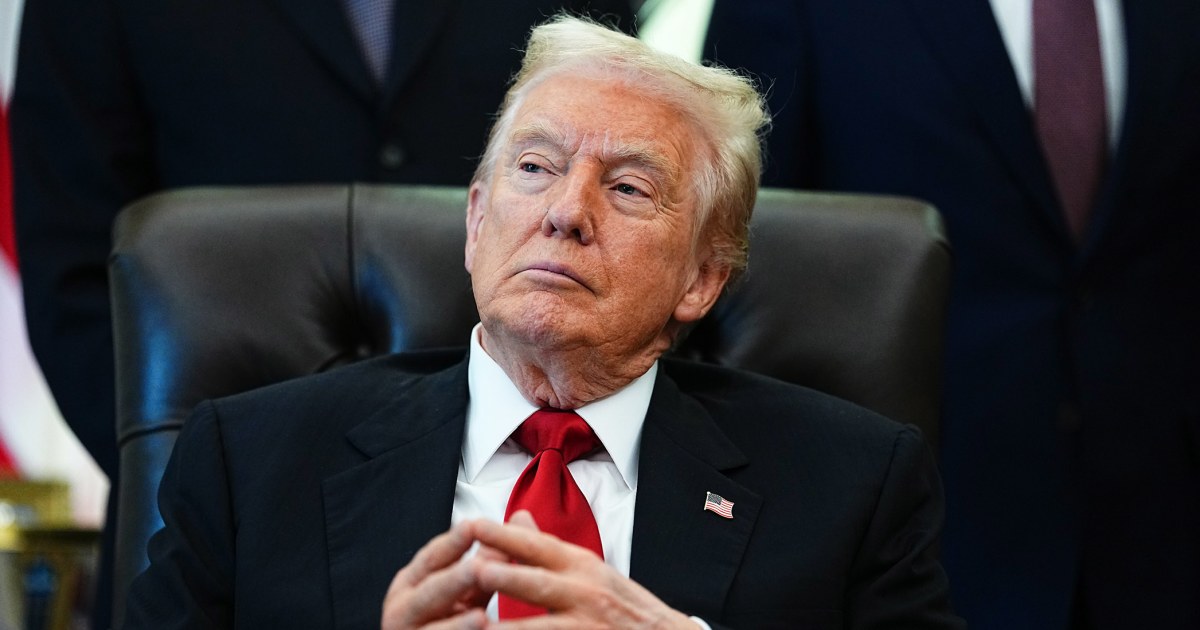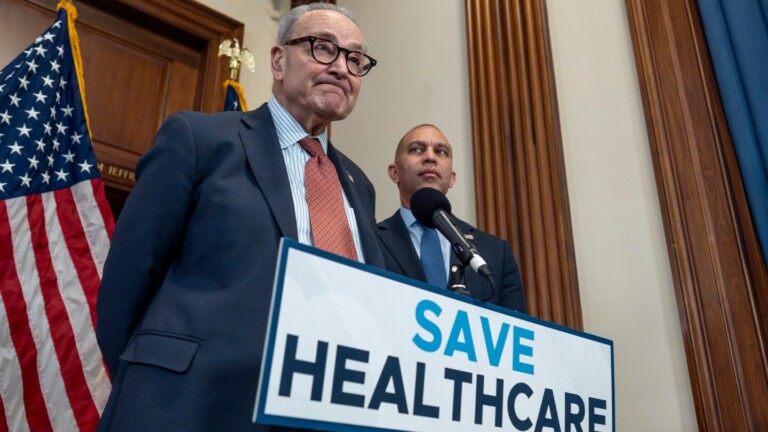Obamacare tax credits look likely to expire as Trump rules out an extension
WASHINGTON — Inside a closed-door meeting of House Republicans on Tuesday, Rep. Jen Kiggans, a swing district member who is a linchpin of the party’s narrow majority, stood up and made a plea.
“Doing nothing on health care is not the right answer,” the Virginia Republican later told NBC News, summing up her message to colleagues. “I would really appreciate if we could have a timeline because we know that the end of the calendar year is coming, and I don’t want to see people’s premiums go up. I don’t want to see people lose their health insurance.”
The remarks drew an unspectacular reception.
“Average,” Kiggans replied when asked how it was received. “We line up, we have our one minute to state our case. Usual reaction.”
Republicans are careening to a health care cliff with no solution in hand. An estimated 22 million people in the U.S. are about to see their health insurance premiums soar by, in some cases, thousands of dollars per month, as billions in funding for the Affordable Care Act expires on Dec. 31. The expiring funds, costing about $35 billion per year, were first passed during the pandemic to subsidize insurance payments, capping premiums for a “benchmark” ACA, or “Obamacare,” plan to 8.5% of income.
Kiggans has offered a bill to extend those funds for one year, as a stopgap option to prevent cost increases while Congress haggles over a longer-term solution.
But just 14 Republicans have signed on. And her plea appears to be falling on deaf ears with the rest of the party.
President Donald Trump and Republicans have dialed up their attacks on that pot of funding, making increasingly clear they won’t allow an extension in its current form.
“It’s going to end,” Sen. Rick Scott, R-Fla., said Tuesday evening, citing Trump’s opposition as part of the reason.
Instead, Republican leaders have deputized committee chairs and rank-and-file members to draft alternative options that would give the funds directly to people, perhaps through tax-advantaged health savings accounts (HSAs), flexible savings accounts (FSAs) or even direct cash payments.
“The only healthcare I will support or approve is sending the money directly back to the people,” Trump wrote Tuesday in all caps on social media, saying he won’t accept a continuation of the ACA structure where the funds are provided to insurance companies to keep premiums down. “Congress, do not waste your time and energy on anything else,” Trump added.
Party leaders have taken note.
House Republican leadership railed against the ACA during a closed-door conference meeting Tuesday and made a forceful case against extending the subsidies, according to two lawmakers in attendance. Instead, Republican leaders presented other potential ideas to help lower health care costs.
But at least one House Republican expressed frustration with how little time they have left to write, much less pass, an alternative before the looming ACA cliff. During Tuesday’s meeting, Rep. Nathaniel Moran of Texas stood up and complained that Republicans could have been working on their own health care plan “for months,” the two lawmakers in the room said, instead of six weeks before the tax credits expire.
Trump told reporters in West Palm Beach on Sunday that he is talking with Democrats about a direct health care payment plan, saying: “I’ve had personal talks with some Democrats.”
But a senior White House official on Tuesday could not identify a single Democrat with whom Trump has discussed the issue. On a call with reporters on Monday, Senate Health Committee Chair Bill Cassidy, R-La., couldn’t name a Democrat who is even open to the idea.
“I’ll let Democrats speak for themselves, because I can’t tell you that they’ve all bought in,” he said.
Any plan would require 60 votes to advance in the Senate, which means at least seven Democrats would have to support the legislation. Republicans have floated the prospect of using the filibuster-proof reconciliation process to push through a health care solution without Democrats, but a variety of their proposals would be deemed ineligible for that.
Rep. Rob Bresnahan, R-Pa., who narrowly won a competitive district around Scranton, said expiration of the ACA money without a replacement plan would harm his constituents.
“My district is especially hit hard on this. Ripping the rug out certainly is not the solution,” Bresnahan said. “So I am in support of extending the ACA, the enhanced premium tax credits, for some period of time.”
Rep. Andy Harris, R-Md., said he’s certain ACA funds won’t be extended in their current form.
“There is no way a clean extension comes to the House floor,” Harris said Tuesday after the GOP meeting, even suggesting that it would spark a revolt. “The business would stop in the House completely if an attempt was made to bring that to the floor.”
Rep. Derrick Van Orden, R-Wis., who represents a competitive district that Democrats are targeting in 2026, blasted the law he called the “Unaffordable Care Act” as a failure. He said the subsidies prove that.
“If you have to subsidize something, by definition, it’s not affordable,” Van Orden said, arguing that Democrats don’t “give a s—” about health care beyond their ability to benefit from it politically. “It’s all about their political survival, and it’s, quite frankly, revolting.”
Cassidy said it’s “incorrect to assume that a temporary extension” of ACA funds “can be quickly implemented,” suggesting it’s too late because insurers have set rates for 2026. And even if Democrats prefer a short-term extension, he said, “the president’s not going to sign it.”
Michael Linden, an economic policy expert who worked in the Biden White House budget office while the enhanced health care tax credits were crafted, said Republicans missed their chance to extend the subsidies earlier this year.
“If Republicans in Congress had wanted to avoid big spikes in health care premiums, the logical moment for them to have done so was in the midst of their massive reconciliation bill,” he said.
There may yet be an eleventh-hour push if Republicans are sitting on the brink of the new year with no health care plan.
Rep. Jeff Van Drew, R-N.J., a co-sponsor of the Kiggans bill, said he might consider signing a “discharge petition” to end-run party leaders and force the measure to a House vote.
“I would only think of it if nothing is done that’s satisfactory, and we just have some concepts, but nothing specific,” he said.
Bresnahan didn’t shut the door to supporting a discharge petition but said that one offered by House Minority Leader Hakeem Jeffries, D-N.Y., to extend the subsidies for three years is “a little bit too long.” He said he’s also open to ideas to reform the existing ACA tax credits.
Rep. Mike Lawler, R-N.Y., said he supports a one-year extension of ACA subsidies to give his party time to work on “longer-term issues” with the health care plan.
“Right now, this should be negotiated between the House and the Senate. That will be the fastest way to get an agreement on this,” he said. “A discharge [petition] may move it out of the House, but if the Senate is not in agreement, it’s not going to go anywhere. The objective here is to get this done before the end of the year.”
Sahil Kapur is a senior national political reporter for NBC News.
Melanie Zanona is a Capitol Hill correspondent for NBC News.
Julie Tsirkin is a correspondent covering Capitol Hill.
Peter Alexander
contributed
.







